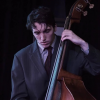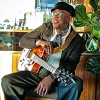Home » Jazz Articles » Album Review » Will Lyle: L.A. Source Codes
Will Lyle: L.A. Source Codes
Lyle, who was born in 1994, started playing bass when he was 12. In the years since he has created a pretty impressive résumé. After his graduation from Berklee College of Music, he went on to play with numerous artists, including Jon Mayer, Bob Sheppard and Joshua Breakstone to name a few. He also received a presidential scholarship to study bass with legendary bassist, Ron Carter.
L.A. Source Codes brings musicians from three different generations to the recording. Dedicated to the memory of Lyle's mentor, Ralph Peterson, the album includes several jazz standards along with some original compositions. While the selections vary in jazz styles ranging from straight-ahead and Latin to modern, the album definitely has a sense of unity throughout. Lyle is joined here by ten different musicians, essentially forming three different groups. The players include Bob Sheppard on tenor saxophone; Marvin "Smitty" Smith, Roy McCurdy and Anthony Fung on drums; pianists Jon Mayer, Mahesh Balasooriya, Mikan Zlatkovich, and Adam Hersh; Nakeiltha Nikki Campbelll on congas; and Jacques Lesure on guitar.
The up-tempo opener, "Forasteria," which is a Lyle original, sets the tone of the album. It features a Brazilian groove combined with some Cedar Walton influences. The word forasteria means outsider in Portuguese, and the song represents the feelings of alienation that practically everyone experiences at one time or another. The song's driving beat and tight groove offers a sense of overcoming obstacles to experience the joy and optimism life has to offer.
L.A. Source Codes includes a good deal of impressive musicianship throughout. While each of the players on the album gets a chance to shine, the bottom line here (no pun intended) is Lyle's bass work. There are instances, such as Frank Loesser's "I Believe in You" and George Gershwin's "It Ain't Necessarily So" where Lyle plays the melody line. He also takes several impressive solos throughout the album, showcasing his talent as a player.
Along with his musical skills, this album also shows that Lyle is a talented composer as well. The originals included are not simply melodies, but each their own musical story. "rains_of_change," for example, transitions from its melodic beginning into a somewhat freeform structure that ultimately returns to the original melody, which seems to reflect going through and overcoming a challenging situation. "La Cumbia de MacArthur Park" celebrates L.A.'s Central American community with powerful rhythms and Adam Hersh's exceptional work on the piano. The atmospheric "Above the Clouds" creates a dreamlike landscape somewhat reminiscent of some ECM recordings.
L.A. Source Codes is an impressive debut album that brings a variety of music and musicians that have influenced Lyle's own playing and writing. Lyle's talent is impressive, and this album shows how effectively he can transform the "source code" into something very satisfying.
Track Listing
Forasteira; Above The Clouds; Be My Love; So in Love; Two for the Road; rains_of_change; La Cumbia de MacArthur Park; No. 1 Green Street; I Believe in You; It Ain't Necessarily So; You Stepped Out of A Dream
Personnel
Will Lyle
band / ensemble / orchestraBob Sheppard
saxophone, tenorMarvin "Smitty" Smith
drumsMahesh Balasooriya
pianoJon Mayer
pianoRoy McCurdy
drumsJacques Lesure
guitarAnthony Fung
drumsMikan Zlatkovich
pianoNakeiltha Nikki Campbell
congasAdam Hersh
pianoAlbum information
Title: L.A. Source Codes | Year Released: 2021 | Record Label: Self Produced
Tags
About Will Lyle
Instrument: Band / ensemble / orchestra
PREVIOUS / NEXT
Support All About Jazz
 All About Jazz has been a pillar of jazz since 1995, championing it as an art form and, more importantly, supporting the musicians who make it. Our enduring commitment has made "AAJ" one of the most culturally important websites of its kind, read by hundreds of thousands of fans, musicians and industry figures every month.
All About Jazz has been a pillar of jazz since 1995, championing it as an art form and, more importantly, supporting the musicians who make it. Our enduring commitment has made "AAJ" one of the most culturally important websites of its kind, read by hundreds of thousands of fans, musicians and industry figures every month.































